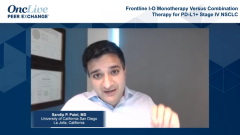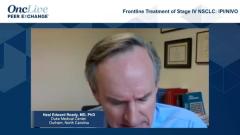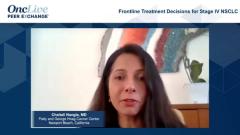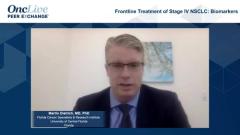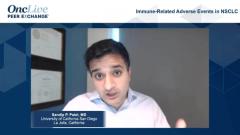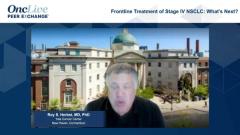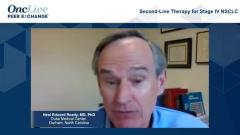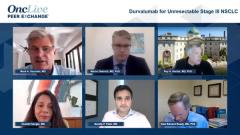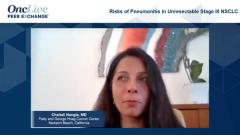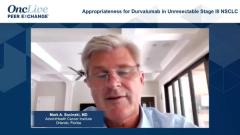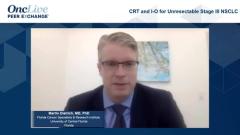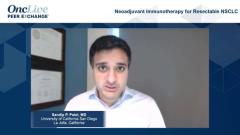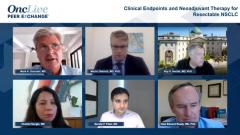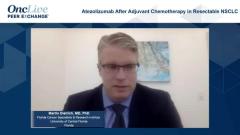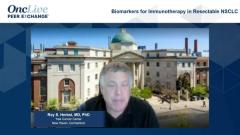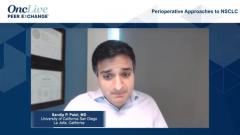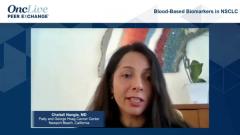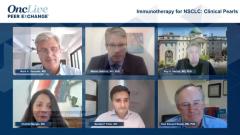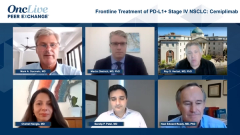
Neoadjuvant Immunotherapy for Resectable NSCLC
Martin Dietrich, MD, PhD, describes his interpretations of the KEYNOTE-799 study of pembrolizumab plus chemoradiation therapy for unresectable stage III non–small cell lung cancer.
Episodes in this series

Mark A. Socinski, MD: Martin, you set the stage mentioning the issue in resectable disease. Not only did we see that phase II trial that you just reviewed nicely, but we also had a number of recent updates or data sets from some new adjuvant trials in non–small [cell lung cancer]. So, I’m going to ask Sandip to give us his thoughts starting with the CheckMate 816 [clinical trial], which we first saw at AACR [American Association for Cancer Research] this year. But some nice surgical outcome data at ASCO [American Society of Clinical Oncology] this year. So, your thoughts, Sandip?
Sandip P. Patel, MD: I really thought this was one of the most exciting areas as Dr. Herbst mentioned earlier. The use of these agents in early and earlier lines of therapy allows for more patients to potentially benefit. One of the theoretical concerns about the use of neoadjuvant therapy, whether it be chemotherapy, targeted therapy, or immunotherapy, or some combination therein have been the fear of creating a toxicity that would prevent the patient going to surgery and occurred of intense setting. That’s obviously something we want to be close to [a] never event. There are multiple studies that have looked at this over time. There’s the NADIM study from Spain, which [was] with chemotherapy plus nivolumab [Opdivo]. There’s the NEOSTAR study which looked at a pure IO [immunotherapy] combination of nivolumab and ipilimumab [Yervoy]. There’s the LCMC3 study which [was] with neoadjuvant atezolizumab [Tecentriq] and it [is] probably the most, at least, robust data set. The one that’s done the most presentations recently because of the excitement around the data. CheckMate 816, this was a phase III study with neoadjuvant nivolumab plus chemotherapy versus chemotherapy alone and [in] the neoadjuvant setting, it was 3 cycles neoadjuvant chemoimmunotherapy. We found a pathological complete response rate of 24% regardless of PD-L1 [programmed death-ligand 1] status with the integration immunotherapy. Without immunotherapy, just chemo alone, it’s about 2% pathologic complete response rate, and so very exciting. We don’t have yet mature survival data, though that this difference in pathologic complete responses is very striking. And one of the more striking differences that we’ve seen. And I think more recently at ASCO, we saw some of the presentations around surgical outcomes. Dr. Forb presented some of the work with pathologic complete response. Dr. Spice represents some of the work related to surgical outcomes, and not only did neoadjuvant chemoimmunotherapy not create problems in terms of going to surgery, but it also actually improves surgical outcomes, which basically went from it being a theoretical weakness, it's actually being a strength of the utilization of chemoimmunotherapy. And not only were there less delays for patients getting the surgery, but more patients got a lobectomy versus a pneumonectomy. The pneumonectomy’s a much more morbid surgery. Patients have less complications with neoadjuvant chemoimmunotherapy presumably because the tumor shrunk. The surgery was made easier. The operating time was reduced in the OR [operating room]. Many virtuous surgical outcomes that really took what was a theoretical concern around the drugs in neo/adju [neoadjuvant/adjuvant] chemoimmunotherapy. It actually demonstrated it’s a strength, this approach. So, I think we’re still waiting for survival data, but this is extremely provocative in terms of the pathologic complete response rate. And it appears feasible and safe based on the surgical outcomes we’ve seen to date.
Mark A. Socinski, MD: I agree with you. That was an impressive presentation with regard to the surgical aspects of this. I don’t think we would anticipate. We’re hoping it wouldn’t be worse, and it looked a little better. And that’s not anything we’ve ever seen, to my knowledge, with chemotherapy. We’ve done a number of neoadjuvant chemotherapy trials, and I don’t think we’ve seen that same effect that was seen in that trial. So that’s quite impressive. And kudos to the CheckMate 816 surgical guys/gals for doing that presentation.
TRANSCRIPT EDITED FOR CLARITY


